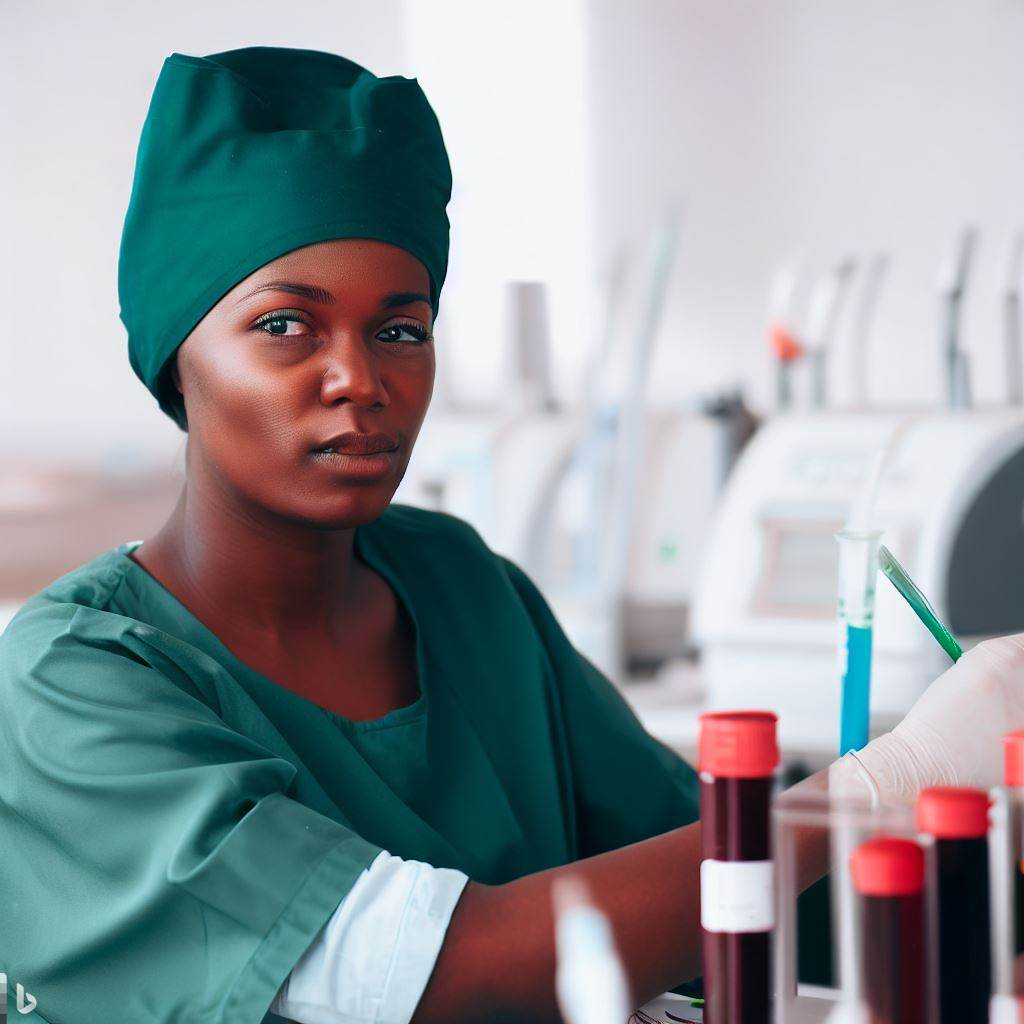Introduction
Phlebotomists play a crucial role in the healthcare system, as they are responsible for drawing blood samples from patients.
In Nigeria, the demand for phlebotomists is increasing rapidly due to advancements in medical technology and the need for accurate diagnostic testing.
This blog post aims to provide aspiring phlebotomists in Nigeria with useful tips for interviews in order to increase their chances of securing a job in this growing field.
Importance of Phlebotomists in Healthcare
Phlebotomists are essential in healthcare settings as they collect blood specimens that are vital for diagnosing and monitoring various medical conditions.
Their expertise ensures accurate and efficient testing, which in turn helps doctors make informed treatment decisions. Without skilled phlebotomists, the healthcare system would suffer from delays and inaccurate results.
Growing demand for phlebotomists in Nigeria
With advancements in medical technology, the demand for phlebotomists in Nigeria is rising.
Hospitals, clinics, and diagnostic centers rely heavily on phlebotomists to perform blood tests and handle specimens appropriately.
This growing demand offers promising job opportunities for aspiring phlebotomists. Below, we will provide aspiring phlebotomists in Nigeria with valuable tips for interviews.
Interviewing for a phlebotomy position can be competitive, and being well-prepared can give candidates a significant advantage.
By following these tips, aspiring phlebotomists can increase their chances of impressing potential employers and securing a job in this thriving field.
Researching the Role of a Phlebotomist
When aspiring to become a phlebotomist in Nigeria, it is crucial to conduct thorough research on the role to ensure a successful career.
This section will provide an overview of phlebotomy as a career, outline the duties and responsibilities of a phlebotomist, and discuss the required skills and certifications.
Overview of Phlebotomy as a Career
Phlebotomy is a medical field that involves the collection of blood samples from patients for diagnostic purposes. As a phlebotomist, you will play a vital role in the healthcare system by ensuring the accuracy and efficiency of blood specimen collection.
Phlebotomists work in various healthcare settings, including hospitals, clinics, laboratories, and blood banks. They work closely with other medical professionals, such as physicians, nurses, and laboratory technicians, to ensure the proper collection and handling of blood samples.
As a phlebotomist, you will have direct contact with patients and will be responsible for making them feel comfortable and at ease during the blood collection process. Good communication skills and a compassionate demeanor are essential in this role.
Duties and Responsibilities of a Phlebotomist
The primary responsibility of a phlebotomist is to collect blood samples safely and accurately. This involves following proper procedures for patient identification, specimen labeling, and infection control.
Phlebotomists must also maintain a sterile and organized work environment. Some of the specific duties of a phlebotomist include:
- Taking medical histories and assessing patient suitability for blood donation.
- Preparing collection equipment and ensuring its cleanliness.
- Locating veins or other suitable blood vessels for blood collection.
- Performing venipuncture or skin puncture techniques for blood sample collection.
- Labeling and documenting the collected specimens accurately.
- Properly storing and transporting blood samples to the laboratory for testing.
- Providing emotional support and reassurance to patients during the procedure.
- Adhering to strict safety protocols to prevent the transmission of infections.
Required Skills and Certifications
To become a phlebotomist in Nigeria, certain skills and certifications are necessary. These include:
- Knowledge of anatomy and physiology, particularly venous and arterial systems.
- Proficiency in venipuncture and skin puncture techniques.
- Understanding of infection control practices to ensure patient and personal safety.
- Strong attention to detail and accuracy in specimen labeling and documentation.
- Excellent communication and interpersonal skills to establish rapport with patients.
- Ability to handle difficult or anxious patients with empathy and professionalism.
In addition to these skills, obtaining a certification in phlebotomy is highly recommended.
Certifications such as the National Certified Phlebotomy Technician (NCPT) or the Certified Phlebotomy Technician (CPT) can enhance your job prospects and demonstrate your commitment to professionalism and quality in the field.
In general, researching the role of a phlebotomist is essential for aspiring phlebotomists in Nigeria. Understanding the career overview, duties and responsibilities, and required skills and certifications will pave the way for a successful and rewarding career in phlebotomy.
Read: Examining the Growth of the Optometry Profession in Nigeria
Preparing for a Phlebotomy Interview
Understanding the employer’s expectations
Here’s how to prepare for your phlebotomy interview by first understanding what the employer expects:
- Identify the skills and qualities that employers typically look for in phlebotomists.
- Research the job description to understand the specific requirements and responsibilities.
- Study the organization’s mission statement and values to align yourself with their expectations.
- Prepare to demonstrate your ability to work in a fast-paced and high-pressure environment.
Researching the organization and its values
- Gather information about the organization’s history, size, and reputation.
- Explore their website and social media platforms to understand their culture and values.
- Identify any recent achievements or projects that you can discuss during the interview.
- Show genuine interest in the organization by asking specific questions about their operations.
Preparing common interview questions and answers
- Practice answering common interview questions such as “Tell me about yourself” or “Why do you want to be a phlebotomist?”.
- Prepare concise and relevant answers that highlight your skills, experience, and motivation.
- Anticipate questions about handling difficult patients, dealing with stressful situations, and following safety protocols.
- Have examples ready to demonstrate your ability to work as part of a team or handle challenging situations.
Highlighting relevant education and experience
- Review your education and training in phlebotomy to ensure a solid foundation in the field.
- Emphasize any certifications or licenses you hold, including first aid and CPR training.
- List any relevant work experience, internships, or volunteer activities in healthcare settings.
- Showcase your knowledge of medical terminology, laboratory procedures, and infection control.
By following these steps to prepare for a phlebotomy interview, you will increase your chances of success and impress potential employers with your knowledge and commitment to the field.
Read: Pharmacy Technician Jobs: Outlook in Nigeria’s Market
Dressing Professionally and Appropriately
Importance of a polished appearance in the medical field
A professional and well-groomed look portrays competence and inspires confidence in patients. In the medical field, appearance is crucial in establishing trust and credibility.
Potential employers want to see that you take your role as a phlebotomist seriously.
Dressing guidelines for a phlebotomy interview
Here are tips to dress appropriately for your phlebotomy interview:
- Wear formal attire such as a well-fitting suit or a conservative dress.
- Choose neutral colors like black, gray, or navy blue to convey professionalism.
- Avoid wearing flashy or distracting clothing that may divert attention from your skills.
- Ensure that your outfit is clean, pressed, and free from wrinkles or stains.
- Make sure your clothes fit comfortably and do not restrict your movement during the interview.
- Wear closed-toe shoes that are appropriate for a professional setting.
- Keep jewelry to a minimum and opt for simple accessories to maintain a polished look.
Accessories and grooming tips to consider
- Maintain good personal hygiene by showering, brushing your teeth, and using deodorant.
- Keep your hair neat and tidy. For men, consider a clean shave or a well-groomed beard.
- For women, tie your hair neatly or style it in a professional manner.
- Ensure that your nails are clean, trimmed, and free from bright or chipped nail polish.
- Avoid wearing heavy perfumes or colognes as they may trigger allergies in sensitive individuals.
- Carry a professional-looking bag or briefcase to hold your credentials and necessary documents.
- Double-check for any lint or stray threads on your outfit before heading to the interview.
Remember, dressing professionally and appropriately not only creates a positive first impression but also reflects your commitment to the phlebotomy profession.
By following these dressing guidelines and grooming tips, you increase your chances of leaving a lasting impact during your interview.
Read: Essential Skills for Pharmacy Technicians in Nigeria
Nailing the Interview
- Arriving early and being punctual: Make sure to plan your trip in advance to avoid any delays in getting to the interview location. Arrive at least 15 minutes before the scheduled interview time to show your punctuality.
- Presenting a confident and friendly demeanor: Wear professional attire that reflects your respect for the position and the organization. Make eye contact, offer a firm handshake, and greet the interviewer with a warm smile.
- Active listening skills and professional communication: Pay attention to the interviewer’s questions and respond thoughtfully and clearly. Speak confidently, using proper language and avoiding slang or casual expressions.
- Showcasing your passion for phlebotomy and patient care: Share specific examples of how you have demonstrated your dedication to patient well-being. Highlight any relevant training, certifications, or experiences that showcase your commitment to phlebotomy.
- Asking thoughtful questions to demonstrate interest: Prepare a list of questions beforehand to show your curiosity about the role and the organization. Ask about opportunities for professional growth or advancements in the field of phlebotomy in Nigeria.
Remember, nailing the interview as an aspiring phlebotomist in Nigeria is crucial to your success. Employers in this field are seeking individuals who not only possess the necessary technical skills but also exhibit the right attitude and dedication to patient care.
By arriving early, presenting yourself confidently, actively listening, showcasing your passion, and asking thoughtful questions, you can leave a lasting impression on the interviewer and increase your chances of securing the position you aspire to.
Read: Comparing Pharmacy Technician Schools in Nigeria

Displaying Technical Skills and Knowledge
Familiarity with phlebotomy techniques and equipment
It’s important to stay updated on the latest phlebotomy techniques and advancements in equipment. First, understand the correct usage of different phlebotomy tools such as needles, tubes, and collection devices.
Then, you must be able to identify and select appropriate equipment based on the nature of the blood test.
It’s also essential to demonstrate proficiency in handling and maintaining phlebotomy equipment. In addition, you must ensure the cleanliness and sterility of all equipment before use.
Demonstrating proficiency in blood collection procedures
Here are tips to demonstrate your proficiency in blood collection:
- Be skilled in evaluating the suitability of veins for blood collection.
- Perform venipuncture with confidence and precision.
- Follow the proper technique for locating veins, inserting the needle, and drawing blood.
- Avoid excessive probing and repeating venipuncture attempts to minimize patient discomfort.
- Collect the right amount of blood required for each specific test.
- Ensure correct labeling and documentation of blood samples for identification purposes.
Handling difficult situations or patients with care
There may be occasions when patient care becomes difficult. Here are tips to handle it like a pro:
- Develop strong communication skills to establish rapport with nervous or anxious patients.
- Show empathy and understanding towards patients who may have phobias or medical anxieties.
- Maintain a calm and reassuring demeanor to help ease the patient’s fears during the blood collection process.
- Address any concerns or questions raised by patients in a professional and compassionate manner.
- Handle difficult or uncooperative patients tactfully, ensuring their safety and the success of the procedure.
- Resolve conflicts or misunderstandings professionally to maintain a positive work environment.
By showcasing your technical skills and knowledge, you can establish yourself as a competent and reliable phlebotomist.
Remember, continuous learning and improvement are essential in this field to keep up with the latest advancements and provide quality care to patients.
Highlighting Transferable Skills
In addition to the technical skills required for phlebotomy, aspiring phlebotomists in Nigeria should also possess a range of transferable skills that are valuable in this profession. These skills include:
Communication and interpersonal skills
Strong communication skills are essential for phlebotomists to effectively interact with patients and other healthcare professionals.
Phlebotomists must be able to explain procedures clearly, provide instructions to patients, and answer any questions they may have. They should also be empathetic and compassionate, as they often deal with patients who may be anxious or in discomfort.
Interpersonal skills are important for building rapport with patients and creating a comfortable and trusting environment during blood collection.
Attention to detail and accuracy
Phlebotomists must have a keen eye for detail to accurately label specimens and ensure that the right tubes are used for different tests. They must follow strict protocols and guidelines to ensure the integrity and accuracy of the collected samples.
Maintaining meticulous records and documentation is crucial to avoid mix-ups or errors in patient information. Attention to detail is also necessary when verifying patient identification and confirming the requested tests.
Ability to handle stressful situations
Working as a phlebotomist in Nigeria can be highly demanding and fast-paced, especially in busy hospitals or clinics. Phlebotomists must remain calm and composed in stressful situations and be able to perform their duties efficiently.
They should be able to handle difficult or anxious patients, while maintaining professionalism and ensuring their safety. Having effective stress management techniques can help phlebotomists cope with the pressures of the job.
Teamwork and collaboration
Phlebotomists often work as part of a healthcare team, collaborating with nurses, doctors, and laboratory staff. They must be able to effectively communicate and coordinate with colleagues to ensure smooth workflow and timely specimen processing.
Teamwork is crucial for maintaining patient safety, facilitating efficient sample collection, and delivering accurate test results.
Phlebotomists should be willing to assist their peers and contribute to a cohesive and supportive work environment.
By highlighting these transferable skills on their resumes and during interviews, aspiring phlebotomists in Nigeria can demonstrate their suitability for the profession. These skills not only enhance their technical abilities but also contribute to providing quality patient care.
Following Up After the Interview
After the interview, your job as an aspiring phlebotomist in Nigeria is not yet done. Following up is crucial to leave a lasting impression on the hiring manager and increase your chances of landing the job.
Here are some important steps to take:
Sending a thank-you email or note to express gratitude
Within 24 hours of the interview, it is essential to send a thank-you email or note to the interviewer. This simple gesture shows your appreciation for the opportunity to interview and your professionalism.
Make sure to personalize your message and mention specific points from the interview to make it more impactful.
Reemphasizing key strengths and qualifications
In your thank-you email or note, take the opportunity to remind the hiring manager of your key strengths and qualifications.
This is your chance to remind them why you are the best fit for the phlebotomist role. Be concise and confident, highlighting relevant experiences and skills that make you a standout candidate.
Inquiring about the next steps in the hiring process
It is perfectly acceptable to inquire about the next steps in the hiring process. This shows your genuine interest in the position and your eagerness to move forward.
Politely ask about the timeline for making a decision and express your availability for any additional interviews or tests they may require.
This proactive approach demonstrates your enthusiasm and commitment. Following up after the interview is just as important as the interview itself. It allows you to maintain contact with the employer and keeps you on their radar.
By sending a thank-you email or note, reemphasizing your strengths, and inquiring about the next steps, you set yourself apart from other candidates and increase your chances of receiving a job offer.
Conclusion
To succeed in a phlebotomy career in Nigeria, aspiring phlebotomists should prioritize acquiring the necessary education and training. They should also work on developing essential skills such as communication, attention to detail, and empathy.
Additionally, it is important to hone their practical skills through internship programs and hands-on experiences. Familiarity with safety protocols and the ability to handle various medical equipment is also crucial.
Lastly, being confident, professional, and well-prepared for interviews can significantly increase their chances of landing a phlebotomy job.
Despite the challenges and competition in the field, pursuing a phlebotomy career in Nigeria can be highly rewarding. Phlebotomists play a vital role in the healthcare system, helping in blood collection and diagnosis.
With the right skills, knowledge, and determination, aspiring phlebotomists can contribute to improving healthcare outcomes and making a positive impact on patients’ lives.
A successful phlebotomy career can also provide stability, job satisfaction, and opportunities for professional growth.
Closing thoughts and final remarks
Becoming a phlebotomist in Nigeria requires dedication, continuous learning, and practice. By following the interview tips provided, aspiring phlebotomists can increase their chances of securing a position in this field.
It is important to remember that success in phlebotomy goes beyond interviews; continuous development and keeping up with advancements in healthcare are equally important.
With perseverance and a passion for healthcare, aspiring phlebotomists can embark on a fulfilling and successful career in Nigeria.




